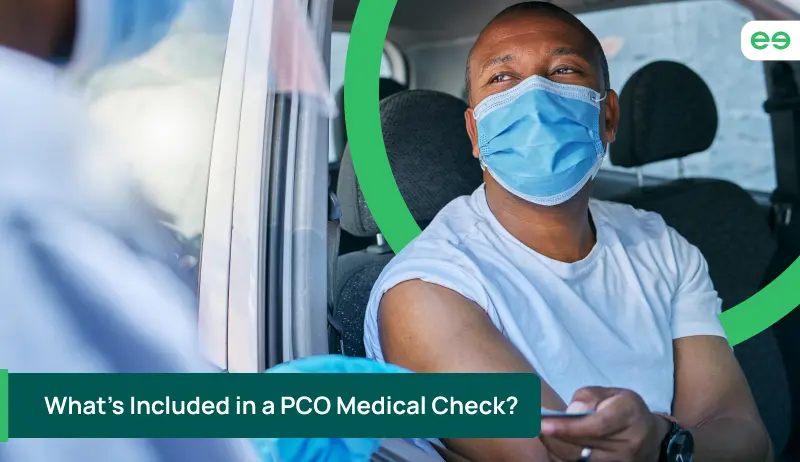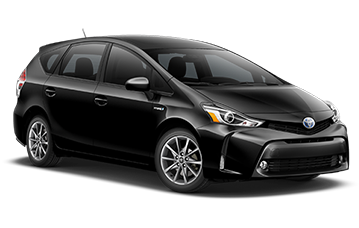What’s Included in a PCO Medical Check?

A PCO medical check is an essential step for individuals looking to become private hire drivers in London. This examination ensures you are physically and mentally fit to operate as a PCO driver. It is a thorough assessment conducted by your GP or a GMC-approved specialist to identify any health conditions that could affect your ability to drive safely.
Since PCO drivers spend long hours on the road, good health is vital not only for their own safety but also for passengers and other road users.
Highlights
A PCO medical check includes:
- General health check
- Vision test
- Blood pressure check
- Neurological conditions (nerve and brain health) check
- Diabetes check
- Heart health check









General Health Check
During this check, the doctor will review your overall medical history to identify any conditions that might affect your ability to drive. They’ll ask questions about:
- Past illnesses (such as strokes, heart disease, or severe infections).
- Ongoing medical conditions (e.g., diabetes, epilepsy, or respiratory diseases).
- Current medications (some medicines can cause drowsiness or affect reaction times).
If you have any long-term medical conditions, bring relevant medical reports from your GP.
Vision Test
Your eyesight must meet DVLA Group 2 Standards to prove that you can safely drive. The test includes:
- Distance vision: You must be able to read a number plate from 20 metres in good daylight. This is the same requirement as for a standard DVLA licence.
- Peripheral vision: Assesses your ability to detect traffic and hazards in your peripheral field.
- Eye conditions: You’ll be asked if you have cataracts, glaucoma, or colour blindness.
Important: If you wear glasses or contact lenses, you must wear them whenever driving. Failing the vision test will delay your PCO application.
Blood Pressure Check:
High or low blood pressure can cause dizziness, fainting, or health risks while driving. During this check, the doctor will:
- Use a blood pressure monitor to check your reading.
- Ask about symptoms like dizziness, headaches, or fatigue.
- Review any medications you take for blood pressure management.
Ideal reading: Below 140/90 mmHg. If too high, you may be required to bring it under control before passing.


Fit to Drive? Find Out Now
Make sure your body is as ready to drive as you are. Book your medical today.
Neurological Conditions (Brain & Nerve Health)
Certain neurological conditions can impact your ability to react quickly and safely. Therefore, during the assessment, the doctor will check for:
- Epilepsy or seizures: If you have had a seizure in the past 10 years, you may need additional medical clearance.
- Blackouts, fainting, or sudden loss of consciousness: These need to be well-managed or fully investigated before getting approval.
- Parkinson’s disease, multiple sclerosis, or other nerve disorders: Any condition that affects movement or coordination will be assessed.
If any of these apply, you may be asked for additional specialist reports.
Diabetes Check
Diabetes can affect driving, especially if blood sugar levels fluctuate too much. During the test, the doctor will:
- Ask if you have Type 1 or Type 2 diabetes.
- Check how it is controlled (diet, tablets, or insulin)
- Verify there’s no history of severe hypoglycemia (low blood sugar that causes unconsciousness).
If you use insulin, you’ll likely need to submit additional documentation to show the condition is well-managed.

Heart Health Check
Heart conditions can impact stamina, alertness, and the ability to drive for long hours. When checking your heart health, the doctor will ask about:
- Past heart attacks or strokes: If you’ve had one, you may need to wait a specific recovery period before reapplying.
- Angina (chest pain): If you experience chest pain while driving, this could be considered dangerous for yourself and the passengers.
- Heart surgery or pacemakers: If you’ve had a procedure like a bypass or pacemaker fitted, further clearance may be needed.
- Shortness of breath or palpitations: These could indicate an underlying heart issue.
Conclusion
The PCO medical check is a vital part of the PCO licensing process. By thoroughly assessing your physical and mental health, it confirms that you are fit to drive and can provide a safe service to passengers. If you’re planning to apply for a PCO licence, make sure to schedule your medical check with a qualified doctor and come prepared to complete the process. Your health and safety, as well as that of others, depend on it.

Get Your Car Today!
Frequently Asked Questions
What is the purpose of a PCO medical check?
PCO medical check is performed to confirm that you are medically fit to drive long hours. If you have a condition that affects your ability to drive safely, you will be denied the licence.
Who decides if you are medically fit for PCO work?
The Driver and Vehicle Licensing Agency (DVLA) decides whether or not you are fit for PCO work. They make their decision based on the information received from medical professionals, drivers undergoing the test, and their own assessments.
How to pass PCO medical check?
Stop drinking alcohol well before the test date and adopt a healthy lifestyle. Sleep well, eat food rich in nutrition, and exercise regularly.
Suggested Blogs
To get more information like this
Subscribe to our newsletter
Ready to Drive? Secure Your PCO Eligible Car in Minutes!
London’s roads are full of opportunities, and Fleeto helps you get started quickly. Whether you’re a new or experienced driver, we provide PCO-ready, insured, and well-maintained vehicles without the hassle of complex paperwork or long wait times. Just choose your car, and we’ll handle the rest.

